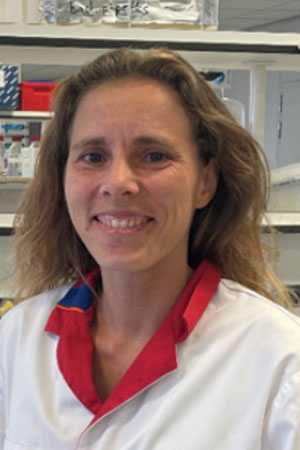Celebration of 40th ISAG Conference Historical Plenary
July 20 (Sun) 17:00~17:50 / National Science Museum
Noelle Cockett
ISAG: Looking back and looking forward
 Noelle Cockett received her BS in animal science from Montana State University and MS and PhD degrees in animal breeding and genetics from Oregon State University. After five years as a research geneticist at the United States Department of Agriculture-Agricultural Research Service's US Meat Animal Research Center in Clay Center, Nebraska, Noelle joined Utah State University (USU) in 1990 and has served in several administrative positions, including dean of the College of Agriculture and Applied Sciences, vice president of extension, executive vice president and provost, and, most recently, as USU president. She returned to the Department of Animal, Dairy and Veterinary Science in 2023 to conduct research in animal genomics and is the instructor for animal breeding and genetics.
Noelle Cockett received her BS in animal science from Montana State University and MS and PhD degrees in animal breeding and genetics from Oregon State University. After five years as a research geneticist at the United States Department of Agriculture-Agricultural Research Service's US Meat Animal Research Center in Clay Center, Nebraska, Noelle joined Utah State University (USU) in 1990 and has served in several administrative positions, including dean of the College of Agriculture and Applied Sciences, vice president of extension, executive vice president and provost, and, most recently, as USU president. She returned to the Department of Animal, Dairy and Veterinary Science in 2023 to conduct research in animal genomics and is the instructor for animal breeding and genetics.
During her presidency, Cockett prioritized student success, USU's excellence in research, particularly in land, water, air, and space, and the outreach USU does in the health and well-being of individuals, families, and communities. Cockett's research has centered on the genetic influences on traits in small ruminants as well as the development of resources that advance farm animal genomics.
Frank Nicholas
From phenome to genome and back again: Adventures in animal genetics
 After graduating with a BScAgr degree from the University of Sydney and gaining a PhD in genetics from the University of Edinburgh, Frank Nicholas returned to the University of Sydney, where he has spent the last 50 years as an academic. He retired from paid employment at the end of 2007 but continues to work with younger colleagues on a range of projects. He is the author of the textbooks Veterinary Genetics and Introduction to Veterinary Genetics, and the co-author (with his wife, Jan) of Charles Darwin in Australia. Under the mentorship of Victor McKusick, he founded the database Mendelian Inheritance in Animals. In 1995, this became the website Online Mendelian Inheritance in Animals (OMIA), which he curated for 27 years, until handing over to Imke Tammen in 2023. Realising that OMIA needed a computerised list of standardised breed names and synonyms, in recent years he instigated the creation of the Vertebrate Breed Ontology (VBO), whose development is being led, facilitated and funded by colleagues in the Monarch Initiative.
After graduating with a BScAgr degree from the University of Sydney and gaining a PhD in genetics from the University of Edinburgh, Frank Nicholas returned to the University of Sydney, where he has spent the last 50 years as an academic. He retired from paid employment at the end of 2007 but continues to work with younger colleagues on a range of projects. He is the author of the textbooks Veterinary Genetics and Introduction to Veterinary Genetics, and the co-author (with his wife, Jan) of Charles Darwin in Australia. Under the mentorship of Victor McKusick, he founded the database Mendelian Inheritance in Animals. In 1995, this became the website Online Mendelian Inheritance in Animals (OMIA), which he curated for 27 years, until handing over to Imke Tammen in 2023. Realising that OMIA needed a computerised list of standardised breed names and synonyms, in recent years he instigated the creation of the Vertebrate Breed Ontology (VBO), whose development is being led, facilitated and funded by colleagues in the Monarch Initiative.
Plenary Keynote Speakers
July 21 (Mon) ~July 24 (Thu) / Grand Ballroom, DCC
Evan Eichler
Long-read sequencing and complete genomes
July 21 (Mon) 09:00~09:50
 Evan Eichler is a Professor of Genome Sciences and Howard Hughes Medical Institute Investigator. He received his Ph.D. from Baylor College of Medicine. After his postdoctoral fellowship at Lawrence Livermore National Laboratory, he joined Case Western Reserve University in 1997 and the University of Washington in 2004. His research group provided the first genome-wide view of segmental duplications within human and primate genomes. He is a leader in identifying and sequencing normal and disease-causing structural variation in the human genome. The long-term goal of his research is to understand the evolution and mechanisms of recent gene duplication and its relationship to copy number variation and human disease with a specific emphasis on the genetic architecture of autism and neurodevelopmental delay.
Evan Eichler is a Professor of Genome Sciences and Howard Hughes Medical Institute Investigator. He received his Ph.D. from Baylor College of Medicine. After his postdoctoral fellowship at Lawrence Livermore National Laboratory, he joined Case Western Reserve University in 1997 and the University of Washington in 2004. His research group provided the first genome-wide view of segmental duplications within human and primate genomes. He is a leader in identifying and sequencing normal and disease-causing structural variation in the human genome. The long-term goal of his research is to understand the evolution and mechanisms of recent gene duplication and its relationship to copy number variation and human disease with a specific emphasis on the genetic architecture of autism and neurodevelopmental delay.
Lusheng Huang (Bin Yang)
Creation of a 12 generation, 8-breed intercrossed heterogeneous pig population and its implication in the dissections of complex traits
July 21 (Mon) 09:50~10:40
 Bin Yang (inset) will be presenting on behalf of Lusheng Huang, who is unable to attend due to unforeseen official duties. Yang is a professor at the National Key Laboratory of Pig Genetic Improvement and Germplasm Innovation, Jiangxi Agricultural University.
Bin Yang (inset) will be presenting on behalf of Lusheng Huang, who is unable to attend due to unforeseen official duties. Yang is a professor at the National Key Laboratory of Pig Genetic Improvement and Germplasm Innovation, Jiangxi Agricultural University.
Lusheng Huang is a professor and president of Jiangxi Agricultural University. He is an academician of the Chinese Academy of Sciences, president of the Chinese Society of Animal Husbandry and Veterinary Medicine, director of the National Committee for Domestic Animal Genetic Resources of the Ministry of Agriculture and Rural Affairs, and director of the National Key Laboratory of Pig Genetic Improvement and Germplasm Innovation, Ministry of Science and Technology of China. He has conducted a series of comprehensive studies on the genetic and molecular mechanisms of complex traits in both commercial and indigenous pig breeds worldwide. His research has elucidated causative mutations and their molecular mechanisms underlying economic traits of pigs, including vertebral number, meat quality, carcass and bone length, disease resistance, and coat color. He has led the development of genomic breeding chips, which have been applied in all pig-producing provinces in China and in other countries worldwide. These chips have led to the creation of a new pig breed, Shanxia long black, with superior growth performance and meat quality traits.
Steven Harrison
Advancing the standards for variant classification: Updates from ClinGen and ACMG
July 22 (Tue) 08:30~09:20
 Steven Harrison, PhD, FACMG, is a board-certified molecular geneticist working as a Laboratory Director at Ambry Genetics. His work focuses on variant classification approaches and standardization at both a CLIA-certified molecular diagnostic laboratory and as part of the NIH-funded Clinical Genome Resource (ClinGen) program. Within ClinGen, Steven co-chairs the Sequence Variant Interpretation Working Group, which aims to develop general recommendations to the ACMG-AMP variant interpretation guidelines. He completed his PhD in Genetics & Development in 2014 at the University of Texas Southwestern Medical Center and completed his ABMGG Clinical Molecular Genetics and Genomics fellowship in 2018 at Harvard Medical School.
Steven Harrison, PhD, FACMG, is a board-certified molecular geneticist working as a Laboratory Director at Ambry Genetics. His work focuses on variant classification approaches and standardization at both a CLIA-certified molecular diagnostic laboratory and as part of the NIH-funded Clinical Genome Resource (ClinGen) program. Within ClinGen, Steven co-chairs the Sequence Variant Interpretation Working Group, which aims to develop general recommendations to the ACMG-AMP variant interpretation guidelines. He completed his PhD in Genetics & Development in 2014 at the University of Texas Southwestern Medical Center and completed his ABMGG Clinical Molecular Genetics and Genomics fellowship in 2018 at Harvard Medical School.
Monique van der Wijst
Usage of single-cell gene regulatory networks for the fine-mapping and interpretation of genetic variation
July 22 (Tue) 09:20~10:10
 Monique van der Wijst is a molecular biologist who applies novel single-cell technologies to study the interplay between genetic and environmental factors in immune-mediated diseases. In addition, in 2019 and 2023 she received NWO Veni and Vidi grants, respectively, to pursue how (non-genetic) cell-to-cell variability impacts gene expression, its regulation, and the immune response. Moreover, in 2018, she set up the sc-eQTLGen consortium (https://eqtlgen.org/sc), in which, together with a network of 28 participating groups, pipelines have been set up to conduct large-scale single-cell analyses in population genetic datasets. With all these efforts combined, she aims to gain a personalized understanding of gene regulation that can improve precision medicine in the future.
Monique van der Wijst is a molecular biologist who applies novel single-cell technologies to study the interplay between genetic and environmental factors in immune-mediated diseases. In addition, in 2019 and 2023 she received NWO Veni and Vidi grants, respectively, to pursue how (non-genetic) cell-to-cell variability impacts gene expression, its regulation, and the immune response. Moreover, in 2018, she set up the sc-eQTLGen consortium (https://eqtlgen.org/sc), in which, together with a network of 28 participating groups, pipelines have been set up to conduct large-scale single-cell analyses in population genetic datasets. With all these efforts combined, she aims to gain a personalized understanding of gene regulation that can improve precision medicine in the future.
Heebal Kim
Learning from African cattle and the Vertebrate Genome Project
July 22 (Tue) 10:40~11:30
 Dr. Heebal Kim is a professor in the Department of Food and Animal Biotechnology at Seoul National University (SNU), specializing in bioinformatics, population genetics, and computational molecular evolution. He earned his B.Sc. in Animal Science from SNU in 1991 and an M.Sc. in Animal Science in 1997. In 2003, he completed a dual-major Ph.D. in Animal Genomics and an M.Sc. in Computer Science at the University of Delaware. He then completed his postdoctoral training in Statistical Genetics at Rockefeller University in 2004.
Dr. Heebal Kim is a professor in the Department of Food and Animal Biotechnology at Seoul National University (SNU), specializing in bioinformatics, population genetics, and computational molecular evolution. He earned his B.Sc. in Animal Science from SNU in 1991 and an M.Sc. in Animal Science in 1997. In 2003, he completed a dual-major Ph.D. in Animal Genomics and an M.Sc. in Computer Science at the University of Delaware. He then completed his postdoctoral training in Statistical Genetics at Rockefeller University in 2004.
Dr. Kim's research focuses on computational approaches to genomic selection, genome-wide association studies, and uncovering genomic signatures of domestication in animals. He has been actively involved in international initiatives such as the African Cattle Genome Project and the Vertebrate Genomes Project. His interdisciplinary work integrates computational tools with biological research, driving advancements in genomics and biotechnology.
Sang Hong Lee
Novel GWAS method to unravel direct and indirect effects on complex traits in livestock
July 23 (Wed) 09:00~09:50
 Dr. Sang Hong Lee is an Associate Professor at the University of South Australia (UniSA), leading the Statistical Genetics Group at the Australian Centre for Precision Health. After earning his degree from Dong-A University in South Korea (1998), he began his career in livestock breeding and pharmaceuticals, which fueled his interest in Best Linear Unbiased Prediction (BLUP) modeling and advanced statistical genetics.
Dr. Sang Hong Lee is an Associate Professor at the University of South Australia (UniSA), leading the Statistical Genetics Group at the Australian Centre for Precision Health. After earning his degree from Dong-A University in South Korea (1998), he began his career in livestock breeding and pharmaceuticals, which fueled his interest in Best Linear Unbiased Prediction (BLUP) modeling and advanced statistical genetics.
Dr. Lee earned his PhD from the University of New England (UNE), Australia, in 2006. His research focuses on developing innovative statistical methods to analyze genotype-phenotype relationships, estimate genetic variance, and explore gene-environment interactions. His multidisciplinary work spans animal and plant breeding, human genetics, and social sciences.
Dr. Lee has authored over 120 peer-reviewed publications, cited approximately 40,000 times, earning an h-index of 64 (Google Scholar). His methodologies are widely recognized for bridging theoretical genetics with practical applications, influencing global research in livestock breeding and human precision health.
Juha Kantanen
Genomic diversity, adaptation, and priority strategies for animal genetic resources conservation
July 24 (Thu) 08:30~09:20
 The professional activities of Professor of Livestock Genomics Juha Kantanen at Natural Resources Institute Finland focus on animal genetic and genomic research projects and the coordination of the animal genetic resources section of the Finnish National Genetic Resources Programme for Agriculture, Forestry and Fishery. The main objectives of the research projects have been the examination of genetic diversity in domestic animal species, investigation of the evolutionary and demographic factors shaping genetic diversity and characterisation of animal genetic resources. The domestic animal species included in the research projects have been cattle (Bos taurus and B. indicus), chicken (Gallus gallus domesticus), goat (Capra hircus), horse (Equus caballus), reindeer (Rangifer tarandus) and sheep (Ovis aries). Through international collaboration, data collected by several international research groups have been combined, and large globally unique datasets have been obtained for population genetics and population genomics analyses. In addition, he has published multidisciplinary scientific publications on the valuation of animal genetic resources in collaboration with anthropologists, archaeologists, and sociologists. Professor Kantanen acts as a chair of the ISAG-FAO Advisory Group on Animal Genetic Diversity.
The professional activities of Professor of Livestock Genomics Juha Kantanen at Natural Resources Institute Finland focus on animal genetic and genomic research projects and the coordination of the animal genetic resources section of the Finnish National Genetic Resources Programme for Agriculture, Forestry and Fishery. The main objectives of the research projects have been the examination of genetic diversity in domestic animal species, investigation of the evolutionary and demographic factors shaping genetic diversity and characterisation of animal genetic resources. The domestic animal species included in the research projects have been cattle (Bos taurus and B. indicus), chicken (Gallus gallus domesticus), goat (Capra hircus), horse (Equus caballus), reindeer (Rangifer tarandus) and sheep (Ovis aries). Through international collaboration, data collected by several international research groups have been combined, and large globally unique datasets have been obtained for population genetics and population genomics analyses. In addition, he has published multidisciplinary scientific publications on the valuation of animal genetic resources in collaboration with anthropologists, archaeologists, and sociologists. Professor Kantanen acts as a chair of the ISAG-FAO Advisory Group on Animal Genetic Diversity.
Arang Rhie
Once upon a time, I was carrying an rDNA
July 24 (Thu) 09:20~10:10
 My goal is to better understand genome biology by developing new computational methods. While realizing the lack of complete, accurate reference genomes, I became interested in generating high-quality genome assemblies. I co-led building and phasing of the first Korean human genome during my Ph.D, which was recognized as an application milestone from the past 40 years of DNA sequencing. Still, long-read sequencing technologies are evolving fast, with needed computational methods lagging behind.
My goal is to better understand genome biology by developing new computational methods. While realizing the lack of complete, accurate reference genomes, I became interested in generating high-quality genome assemblies. I co-led building and phasing of the first Korean human genome during my Ph.D, which was recognized as an application milestone from the past 40 years of DNA sequencing. Still, long-read sequencing technologies are evolving fast, with needed computational methods lagging behind.
Since I joined the Phillippy lab as a post-doctoral researcher, I participated in several large-scale genome assembly projects, such as the Vertebrate Genomes Project (VGP), Human Pan-genome Reference Consortium (HPRC), and Telomere-to-Telomere consortium (T2T). Benchmarking and evaluating several assembly methods inspired myself to develop new methods for genome assembly, polishing, and evaluation. In particular, I developed the idea of tracking marker sequences (k-mers) in reads and the assembly. With members of the Phillippy lab and collaborators, we released tools such as "Trio-binning", "Merqury", "Merfin", and "Winnowmap". My proposed standard and metrics for the VGP became widely adapted by numerous reference genome building projects.
As a Staff Scientist, I am engaging directly or advising collaborators to build their own T2T genomes. Having the first T2T human genome, and the forthcoming T2T genomes in hands, I am excited to explore the new biology that was inaccessible before.
Chankyu Park
Antimicrobial peptidomics towards improving animal health
July 24 (Thu) 10:40~11:30
 Chankyu Park is a professor in the Department of Advanced Biotechnology at Konkuk University in Seoul, Republic of Korea. He earned his Ph.D. from the University of Illinois at Urbana-Champaign and completed postdoctoral training at the Jackson Laboratory in Maine. His research group specializes in porcine immunogenetics and the characterization of olfactory receptors in Cetartiodactyla through genome-wide analysis. Notably, his group developed high-resolution typing methods for major SLA class I and II genes, the histocompatibility complex of pigs. Recently, their focus has shifted to the genome-wide discovery and evolution of antimicrobial peptides, including cathelicidins and defensins, in diverse animals. His group aims to develop methods for large-scale production of recombinant antimicrobial peptides and to understand their in vivo efficacy. The long-term goal of his research is to enhance animal resilience and robustness to pathogenic infection through immunogenetic understanding and its application to animal breeding.
Chankyu Park is a professor in the Department of Advanced Biotechnology at Konkuk University in Seoul, Republic of Korea. He earned his Ph.D. from the University of Illinois at Urbana-Champaign and completed postdoctoral training at the Jackson Laboratory in Maine. His research group specializes in porcine immunogenetics and the characterization of olfactory receptors in Cetartiodactyla through genome-wide analysis. Notably, his group developed high-resolution typing methods for major SLA class I and II genes, the histocompatibility complex of pigs. Recently, their focus has shifted to the genome-wide discovery and evolution of antimicrobial peptides, including cathelicidins and defensins, in diverse animals. His group aims to develop methods for large-scale production of recombinant antimicrobial peptides and to understand their in vivo efficacy. The long-term goal of his research is to enhance animal resilience and robustness to pathogenic infection through immunogenetic understanding and its application to animal breeding.
